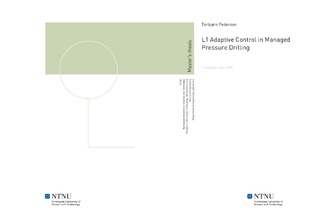L1 Adaptive Control in Managed Pressure Drilling
Master thesis
Permanent lenke
http://hdl.handle.net/11250/259764Utgivelsesdato
2009Metadata
Vis full innførselSamlinger
Sammendrag
The control solution is a crucial part of Managed Pressure Drilling. Existing solutions are often based on Proportional plus Integral (PI) control and have several drawbacks, mainly poor performance for some common drilling operations and a large need for retuning. Better control solutions will reduce costs and improve safety. This thesis presents a comparison of two adaptive control solutions versus a PI benchmark. Both complexity, tuning, performance and robustness will be compared. The two adaptive solutions considered are the well-known Model-Reference Adaptive Control method, and the recently developed $Lone$ adaptive control method. The control solutions are tested on a wide range of common drilling operations, some common controller issues, changing parameters and for two different control setpoints. The adaptive control solutions are shown to give better performance and to have less need for retuning, but not without costs. The main issues of the $mathcal{L}_1$ adaptive controller is low time-delay margins and high computational demands, but the performance is much better than for the benchmark controller. The most important recommendation for future work is evaluation of higher order filter designs for the $mathcal{L}_1$ adaptive controller, because of the potential to both reduce computational needs and to optimize time-delay margins.
